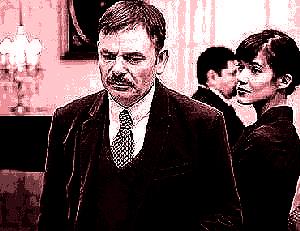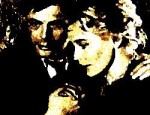Film Review
Director Mathias Gokalp makes an impressive feature debut with this
chilling yet darkly humorous satire on corporate ruthlessness.
Although written before the present economic crisis,
Rien de personnel seems highly
pertinent for our times and offers an acerbic yet very astute
reflection on the brazen manner in which corporations habitually treat
their staff in their mindless pursuit of maximum profitability.
Not only is the film highly topical, it is also imaginatively scripted
and directed and reveals in Gokalp a writer-director auteur with
considerable flair and insight.
Rien de personnel makes good
use of what has become a somewhat hackneyed narrative device -
repeating again and again the same pattern of events from different
perspectives. Akira Kurosawa famously used this technique in his
Samurai masterpiece
Rashomon (1950), and various
other distinguished filmmakers (from Alain Resnais to Stanley Kubrick)
have used it since, with varying degrees of success. The same
multiple-perspective approach seems fitting for Gokalp's film as it
emphasises the many contrasting facets that go up to make a corporation
and drives home the fallacy of drawing conclusions from a single point
of view. It is striking how drastically our impressions are
changed by some very subtle changes to what we are shown. How
easily we can be deceived by what we see, or rather what we are led to
see.
Gokalp directs the film with flair and economy and is well-served by
his highly distinguished cast. With an ensemble that includes
actors of the calibre of Jean-Pierre Darroussin, Denis
Podalydès, Zabou Breitman and Pascal Greggory, it is hard to see
how
Rien de personnel could
fail to be an absorbing divertissement. By situating the
entire film in one location, Gokalp not only underscores the
artificiality of the world of big business - stressing its implacable
rules and uncompromising lack of compassion - but also makes his
characters resemble pieces on a chessboard, all positioning themselves
for greatest personal advantage. It is only when the protagonists
feel themselves under threat that they begin to assert their identity
and realise how dismally phoney and soulless is the world to which they
have committed themselves. There's no place for a conscience in
the corporate world, and even less place for a heart. Business is
business.
© James Travers 2011
The above content is owned by frenchfilms.org and must not be copied.
Film Synopsis
A large pharmaceuticals company arranges a lavish reception for its
employees, ostensibly to launch a new product. In the course of
the evening it becomes apparent to the attendees that this is in fact a
training exercise for the company's managers. But is it more than
that? With the company rumoured to be heading for a takeover its
employees are going to have to fight tooth and nail to keep their
jobs...
© James Travers
The above content is owned by frenchfilms.org and must not be copied.



